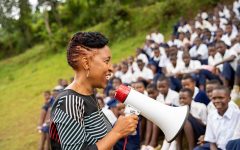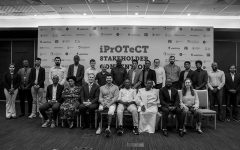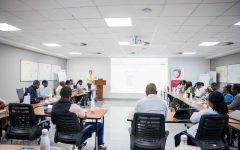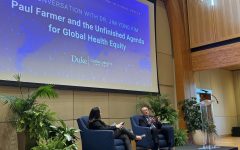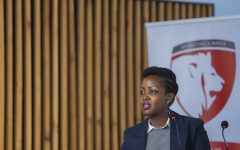Student Profile: Madalitso Mkata Discusses her Commitment to Health Equity, Advocating more about SRHR for Young Women and Girls, and her MGHD Learnings
July 30, 2021 2021-07-30 15:07Student Profile: Madalitso Mkata Discusses her Commitment to Health Equity, Advocating more about SRHR for Young Women and Girls, and her MGHD Learnings
Student Profile: Madalitso Mkata Discusses her Commitment to Health Equity, Advocating more about SRHR for Young Women and Girls, and her MGHD Learnings
Madalitso Mkata, from Malawi, is one of twenty-three students who will receive their Master of Science in Global Health Delivery (MGHD) from UGHE at the virtual Commencement on Sunday, August 22nd 2021. The class of 2021 is the sixth cohort produced by the UGHE’s MGHD program, and the first to have students pursuing the two tracks respectively, One Health and Health Management, in which Madalitso specializes.
The experience gained at UGHE has challenged Madalitso to look at the management of health programs with a different lens. The courses taught in the program have prepared her to become a great advocate for health using scientific activism. She plans to serve as a technical director, where she will provide leadership in the management of thematic health problems affecting Sub-Saharan Africa and beyond.
We talked with Madalisto about how the MGHD program reinforced her dedication to health equity, what she had learned and her future goals.
Q1. What motivated you to join UGHE? What learning opportunities piqued your interest?
I joined UGHE because of its global reputation in terms of academics, as well as the hands-on approach to learning and research methodology. I was particularly eager to learn more about evidence-based global health because, as someone who has primarily worked in public health programming, I was unfamiliar with utilizing data to support decision making. When I heard about UGHE and how their courses are delivered, I was eager to join the MGHD program.
Q2. How has the MGHD program strengthened your commitment to health equity?
This program is more about advancing the equity agenda. I’ve learnt a lot of concepts that I must use as a global health leader. We’ve been told that as global health leaders, we must instil a feeling of urgency. When we have the facts and the data, we can question the authorities and show them how things should be done and how problems should be handled.
If we have data on COVID-19 and then see how marginalized communities groups are being treated such as in vaccinations, there is no equity. We cannot just go out there and start challenging the authorities without understanding what’s going on on the ground.
The MGHD has shown me what it means to utilize this tool for scientific activism, putting facts on the table and then using it to advocate for action. I’ve also learned what it is to collaborate with others, since no man is an island, we all need others to collaborate with us if we are to effect change in places where we have seen injustices. Now that I’ve mastered the program’s concepts, I’m ready to go out there and challenge the status quo.
The program has given me insight into networking, such as when we had webinars during the program and I was able to network with other people from other organizations, such as when we did an entrepreneurship seminar and we were able to get in touch with people from Babson University, who actually connected me to alumni from the university who are running their organizations. My long-term goal is to establish a women’s and girls’ organization, with a focus on sexual reproductive health and rights, as well as economic empowerment. It wasn’t through my own making, it’s because of my presence here at UGHE, so I look forward to starting that organization as well as advocating more about sexual reproductive health rights for young women and girls in Sub-Saharan Africa.
Q3. What did you learn from living and studying in a diverse 2021 cohort?
It’s been an incredible journey. What I’ve mainly learned is that when we speak about diversity, we’re not talking about the cultural distinctions that each of us has, but rather about the unique experiences that each of us brings into the learning spaces. It was fascinating to hear about how we handle problems in Malawi, such as surgery, and then to learn from individuals in other countries, such as Burundi and Ethiopia, about how they address the issue of socioeconomic determinants of health. So it was about the distinct experiences that everyone of us from the global South brought to the learning environment. In my opinion, I was pushed to understand how other programs, such as health care, are handled in other nations, so I learnt a lot. As well, this is how I can deliver in a resource-constrained environment, and this is how I can accomplish it. So, to me, it was more of a learning environment than a place to discuss cultural differences. I discovered the beauty of variety – that in diversity, there is unity.


